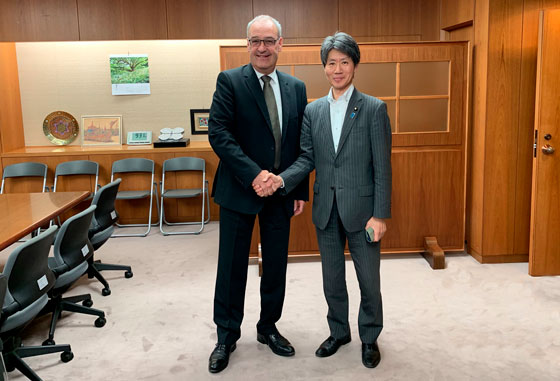
Federal Councillor Guy Parmelin and State Minister of Economy, Trade and Industry, Yoshihiko Isozaki
Japan, the world's third largest economy, behind the United States and China but ahead of Germany, with a population of 127 million, is an essential economic partner for Switzerland.
BIP's growth has slowed since its performance in 2017 (+1.7%). It was set at only 0.8% in 2018, will only reach 1% in 2019 and is likely to reach 0.5% in 2020. After six years of "Abenomics" (Prime Minister Shinzô Abe's economic policy), Japanese economic growth is still not assured in the long term. It should also be noted that its debt is at a record level for an OECD country at 240% of GDP, which limits the government's room for manoeuvre on structural reforms.
Despite a very low unemployment rate (2.2%), wages and private consumption are showing little change and companies remain cautious in their investments. Thus, the government has postponed a further increase in consumption tax, although it has already been decided (from 8% to 10%). In addition, the Bank of Japan targets inflation at 2% but this remained at 1% in 2018. Finally, the country is facing an ageing population and a decline in the active population, compounded by the fact that there are virtually no migratory movements. Faced with a shortage of labour, the Japanese population is steadily decreasing and more and more elderly people are still in employment. In addition, for the first time, this country will accept the hiring of a large number of foreign workers for specific sectors (construction, agriculture, healthcare).
Bilaterally, Japan is our fourth largest economic partner, after the European Union (EU), the United States and China. The trade balance between Switzerland and Japan is strongly favourable to our country. Watchmaking is the second largest Swiss export sector to Japan, behind pharmaceuticals and ahead of gemstones/precious metals/jewellery, optical and medical instruments and machinery. Imports are mainly in the precious metals/jewellery, vehicle and aircraft, pharmaceutical and machinery sectors. It should be noted that Japan is the largest Asian investor in Switzerland, while our country is the seventh largest in the land of the rising sun.
For the Swiss watch industry, Japan has therefore been an important market for a very long time. Indeed, Aimé Humbert-Droz, the ambassador mandated by the Federal Council to establish diplomatic relations with Japan 155 years ago, came from the watchmaking sector. Since then, Swiss watches have always been present on the Archipelago and are now more so than ever.
In 2018, our watch exports to Japan, the fourth largest Swiss watch market in the world, amounted to 1.342 billion francs, which represents 20% of total Swiss exports to the archipelago. In 2019, after six months, the value of our exports amounted to 798 million francs, an increase of 21.8% compared to 2018.
It is in this context that this official mission took was conducted. Its work began at the Nicolas G. Hayek Center (Swatch Group Japan) in Ginza before continuing with the various ministries and local economic organizations. Discussions – in particular with State Minister of Economy, Trade and Industry Yoshihiko Isozaki, focused on bilateral relations, which are excellent. However, they need to be strengthened, which could be done by modernizing the free trade agreement between the two countries. This improvement could focus in particular on agriculture (e.g. processed products), public procurement, technical barriers to trade and certain biotechnological processes. It should be noted that the EU and Japan have concluded a free trade agreement that goes further than the Swiss-Japan agreement. It is therefore important to avoid Swiss companies being less well-positioned than European companies.
The issue of services, in particular financial services, also deserves further consideration. The various interviews were encouraging, but they must now be put into practice. However, it seems that Japan now wishes to focus on multilateralism (WTO) and regionalism (Trans-Pacific Partnership, European Union) rather than bilateralism. Time will tell whether new negotiations can be launched.
August 19, 2019


 News
News